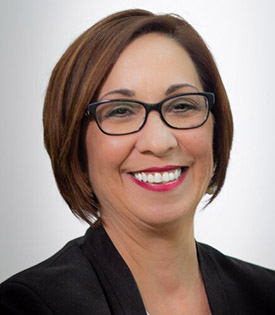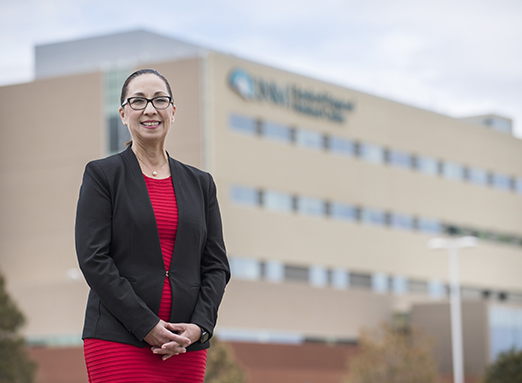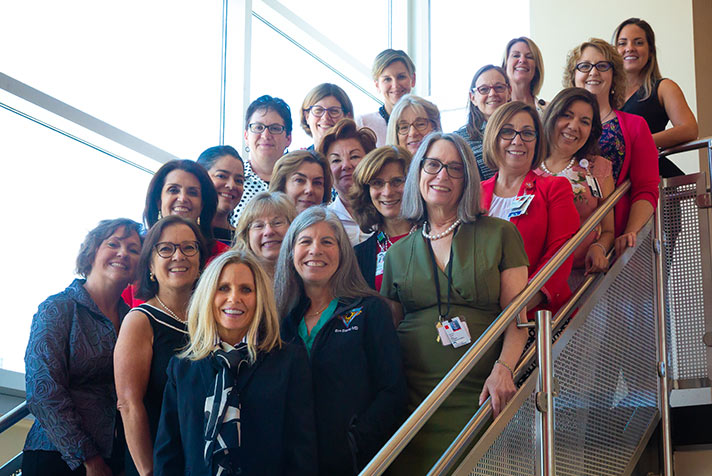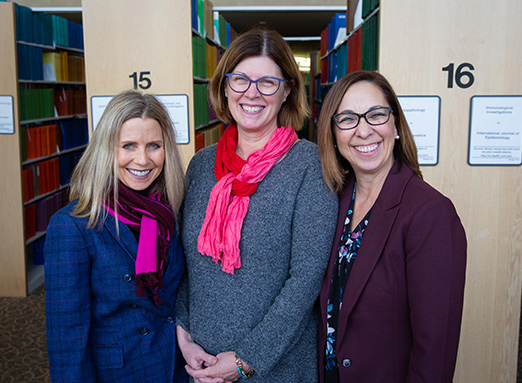 Jamie Silva-Steele has a unique ability to cut through the clutter and focus on meeting people's needs. Most recently, she because the first female CEO of Sandoval Regional Medical Center. But her impacts on the culture of UNM Health Sciences Center started nearly four decades ago at UNM College of Nursing.
Jamie Silva-Steele has a unique ability to cut through the clutter and focus on meeting people's needs. Most recently, she because the first female CEO of Sandoval Regional Medical Center. But her impacts on the culture of UNM Health Sciences Center started nearly four decades ago at UNM College of Nursing.
After graduating from the UNM College of Nursing, she joined the nursing staff at UNM Hospital. She has been an integral part of culture building at UNM Health for over 35 years.
As her career progressed, Jamie served in multiple leadership roles at UNM Hospital. She traveled to participate in a culture fellowship at Mass General, where she gleaned ideas that would help refocus the UNM Health perspective, processes and programs that form our environment today.
Under Jamie's purview, UNM Health Sciences has:
Today, Jamie is leading SRMC's charge to further extend our community outreach across New Mexico. Take a deeper dive into Jamie's history of leadership through the physical and emotional work of enhancing UNM HSC's culture to further promote patient care.
People who work at UNM Health Sciences Center are very focused on our mission. That was why I wanted to work at UNM as a new nurse, because of the patients we serve. And it was an academic facility in which ongoing research and education was always going to be part of what I would be experiencing.
"If given a chance, progress can rise from ugly situations. In 2007, UNM Health was served with a lawsuit from the Office of Civil Rights for failure to provide adequate language interpretation services. At the time, a handful of staff felt strongly that patients should 'just learn English.'
That attitude is against our mission to serve all New Mexicans with respect and honor. It was time for a change.
So, I invited several interpreters to speak at a UNM Hospital management meeting. Prior, I asked them to only address the audience in Spanish. Throughout the session, attendees who only knew English grew increasingly uncomfortable.
At the end, I said, "This is how a Spanish-speaking person feels in our English-speaking hospitals. Language can be a barrier to the most basic care - let alone emergency treatment. " It was a lightbulb moment, and we built upon it as an organization.
Today, we've grown to a double-digit interpreter team. We offer 24/7 video/phone interpreter services in 200+ languages, including American Sign Language, Vietnamese, Dine, and Spanish. It is our role to provide the language conduit. Not because it's required by the Joint Commission, but because it's the right thing to do."

UNM HSC requires staff and providers to take regular courses on language class standards, cultural competency, and health literacy. These programs help us all stay on top of the current needs and newest information to better serve our patients.
"Health care data are powerful, if you analyze it in the right way. Early in our culture work, dived deeper into our community health rates.
Overall, our numbers were acceptable. But when we stratified by key demographics - race, ethnicity, age, language and sex - we found substantial disparities in patient outcomes, particularly for diabetes.
For example, our Southeast Heights community is approximately 80% Vietnamese. Among these patients, readings for the diabetes indicator hemoglobin A1C were off the charts, meaning they were at high risk for type 2 diabetes.
We assessed the situation and found that, despite translating our Diabetes Education program into Vietnamese, the health literacy level of the content was too high. Plus, it focused on the typical American diet, not traditional Vietnamese cuisine. We weren't resonating with the people we intended to serve.
So, we talked with Vietnamese patients and community members. We used their insights to refresh the program with cultural nuances such as traditional values and diet choices. And we did the same thing for our Spanish Diabetes Education."
The results were dramatic. People connected with the content and took away valuable tools to manage their health. We saw substantial improvements in patients' A1Cs and tightened our relationship with patients.

"Exceptional care relies on engaging people in ongoing conversations. There are cultural dynamics to every patient engagement. As providers, we strive to help all patients feel heard and comfortable.
UNM Hospital and our primary care clinics operate Patient, Family and Community Advisory Boards. The community speaks to issues and helps our leaders understand how to improve patient care. From these conversations come opportunities to do better for patients.
For example, UNM Health collaborates with members of New Mexico's LGBTQIA+ community to improve health care experiences. Some patients' names or ID cards reflect a different gender than their physical bodies, and being treated disrespectfully can add to that trauma.
We asked patients who identify as part of this community to discuss how we can provide appropriate care in a comforting, respectful manner. Among other valuable insights, these patients shared that every subtlety, from acknowledging their emotional state to using their preferred pronouns, impacts their experience and willingness to let us take care of them.
Equity endeavors followed these conversations, including enhanced efforts around policy development, patient care standards and hiring practices."

UNM Hospital is recognized year over year for our collaborations with the LGBTQIA+ community, and our initiatives continue to evolve as we connect with more patients who help improve our awareness and institutional education.
"My personal goal is to evolve the culture work that I helped to develop. Perhaps the pandemic, as terrible as it has been, has highlighted the importance of this work.
There are silver linings, including:
Out of adversity rises opportunities to grow, change and do better. And that fits right into the mission of UNM Health Sciences Center: To make more progress in New Mexico's health and health equity than any other state, in collaboration with community partners."
See what others have to say about the culture of diversity, equity and inclusivity on campus at UNM.
UNM Health Sciences and Services Building, First Floor
MSC09 5235
2500 Marble Ave. NE
1 University of New Mexico
Albuquerque, NM 87131
505-272-2728
HSC-Diversity@salud.unm.edu